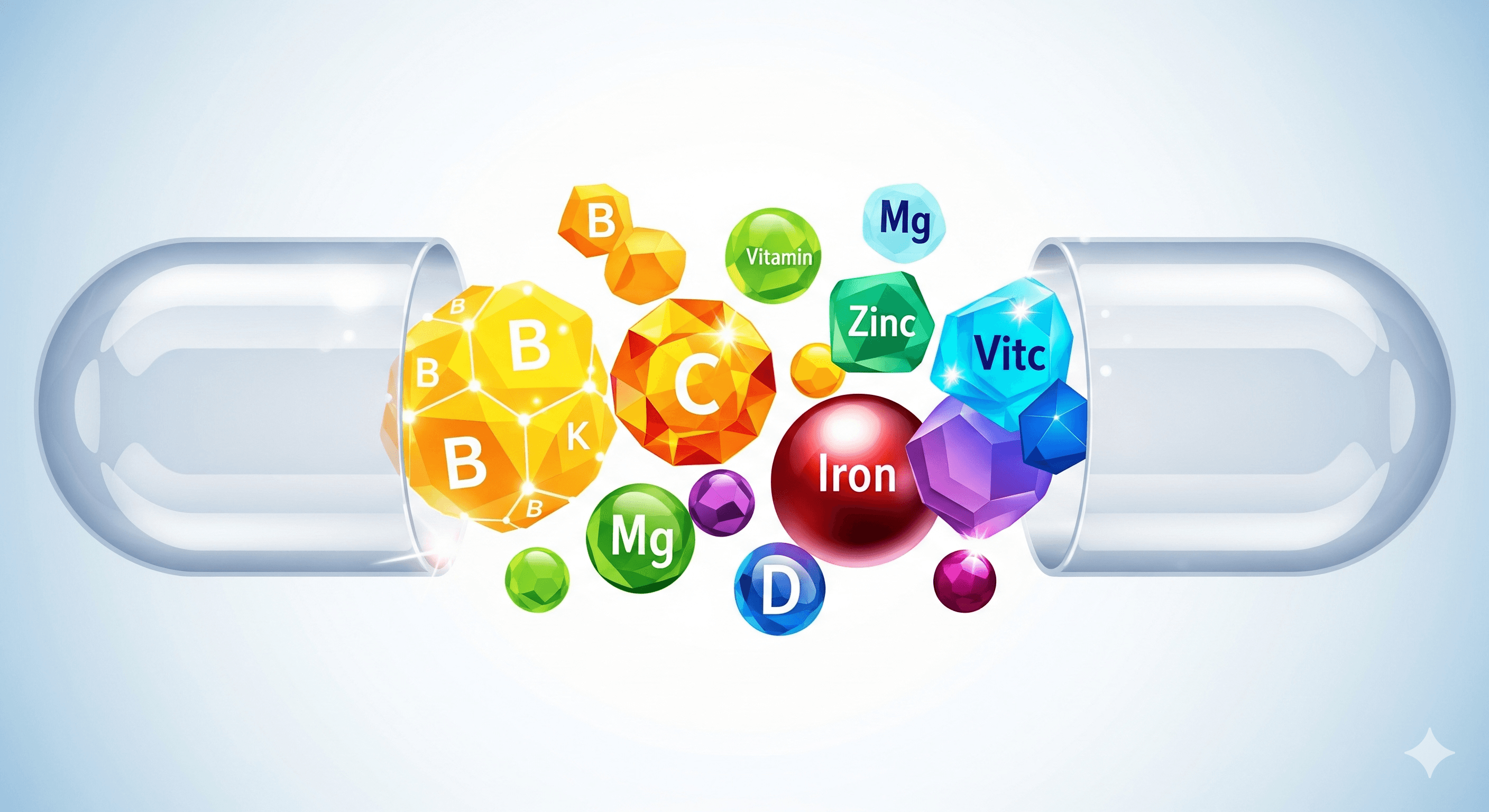Do You Really Need a Multivitamin? A Beginner’s Guide

If you’re browsing a pharmacy shelf—or scrolling online—you’ve probably noticed multivitamins everywhere. Bright bottles. Bold claims. Promises of energy, immune support, or filling nutritional gaps. It sounds appealing. After all, who among us has a perfect diet every single day?
Before you reach for the first bottle you see, let’s slow down and take a clearer look. What is a multivitamin, who might truly benefit, what can’t it do, and how do you pick one without getting lost in marketing?
What Exactly Is a Multivitamin?
In simple terms, a multivitamin is a supplement that bundles together various vitamins and minerals—often a lot of them—into one pill, gummy, or capsule. Think of it as a nutritional backup plan: a single package meant to cover many small vitamin/mineral needs that your diet might be missing.
Because there’s no universal standard for what a multivitamin must include, products vary a lot. Some have high amounts of certain nutrients, some include extras (like herbal additives or probiotics), and some are tailor-made for specific groups—women, older adults, or vegans. Healthline+1
What’s Actually Inside
Although each multivitamin is different, typical components include:
- B-complex vitamins (e.g. B12, folate) — really important for turning what you eat into usable energy.
- Vitamin C — supports immunity, skin repair, and can act as an antioxidant.
- Fat-soluble vitamins A, D, E, and K — these help with vision, bone health, clotting, and more.
- Minerals like calcium, magnesium, zinc, iron — each with specific roles, from muscle function to blood health.
Some products also add extras: herbal blends, probiotics, or other bioactive compounds. Just be aware: more ingredients ≠ better. The body can only absorb so much, and extra substances may interact or compete.
Who Might Benefit Most
If your diet is generally healthy—lots of fruit, vegetables, lean protein, whole grains—you might already be covering most of your needs. But many people have gaps, whether because of lifestyle, health conditions, or age. Here are some groups who tend to get more out of a multivitamin:
- Pregnant women or those planning pregnancy — folic acid, extra iron, and sometimes DHA are essential early on.
- Older adults — as we age, we don’t absorb nutrients like B12 as well, and vitamin D + calcium become more critical for bone health.
- Vegans/vegetarians — certain nutrients like B12, iron, zinc, and calcium are harder to get from plant-only diets.
- People with absorption issues or restrictive diets — conditions like celiac disease, Crohn’s, or past digestive surgeries can make nutrient uptake harder.
These are not the only people who might benefit—but for many others, the gains are smaller and less certain.
What Multivitamins Can and Can’t Do
It’s tempting to see a multivitamin as a safety net, maybe even a shield—for health, aging, disease prevention. Science tells us the picture is more mixed.
What they do well:
- Filling in real nutrient deficiencies (if you have one).
- Supporting specific groups (pregnant people, older adults, those with dietary limitations).
- Possibly improving certain aspects of health when diet alone isn’t enough.
What they don’t do (or the evidence is weak/variable):
- Prevent heart disease or cancer in the average person with no deficiency. Many large studies show little or no effect.
- Increase overall lifespan in healthy adults in a meaningful way.
- Replace whole foods: no supplement gives you fiber, phytonutrients, antioxidants, or the full complexity of nutrients and compounds in whole plants.
Also: taking too much can be harmful. Fat-soluble vitamins build up in the body; iron in excess causes problems; overlapping supplements may lead you to exceed safe intake limits. Office of Dietary Supplements+1
How to Choose Smartly
Here’s a checklist to guide you—so you pick something useful rather than just pretty packaging or hype.
1. Match it to your needs
Choose a formula that aligns with your age, gender, health status. If you’re pregnant, look for prenatal dosages. If you're older, prioritize B12, vitamin D, calcium.
2. Check dosages
Read the label carefully. Some vitamins need more than one pill per day. See how much of each nutrient it provides relative to the Daily Value (DV). Avoid formulas that massively overshoot unless you have medical advice.
3. Look for third-party testing / certification
Because regulation for supplements is lighter than for medicines, choosing ones vetted by independent labs or certification bodies (like USP, NSF, ConsumerLab) helps ensure what’s on the label matches what’s inside.
4. Be skeptical of marketing claims
Words like “doctor approved,” “immune boosting,” “natural,” etc. are often vague. Focus more on evidence and third-party verification than slogans.
5. Safety & Interaction Warnings
Most multivitamins are safe when taken correctly. But a few warnings:
Watch overlaps: If you're already taking vitamin D, or separate iron, or high-dose individual vitamins, adding a multivitamin might push you past safe limits.
Medication interactions: Some vitamins/minerals interfere with drugs (or vice versa). Always check with a healthcare professional.
Excess fat-soluble vitamins: A, D, E, and K accumulate—with potential toxicity if overdone.
A Food-First Philosophy
Here’s a principle many health experts agree on: multivitamins should supplement, not substitute, a healthy diet.
Whole foods give you more than just vitamins—they provide fiber, healthy fats, phytochemicals, water, texture, flavor, variety. All those things matter for health in ways pills can’t replicate. If you can get most of your nutrition from whole, minimally processed foods, you’ll usually see more long-term benefit.
Bottom Line
If you have real or likely nutritional gaps—due to diet, age, health status, pregnancy, or absorption issues—a multivitamin can be a helpful safety net. But it’s not a cure-all. For most healthy adults, the effects are moderate, and whole food + lifestyle (sleep, exercise, stress management) still make the biggest difference.
If you decide to use one, pick a high-quality product, make sure it aligns with your personal needs, avoid mega-doses without medical oversight, and see it as one tool among many—not a magic solution.
Disclaimer:
DocIndia.org does not have any intention to provide specific medical advice, but rather to provide its users and the general public with information to better understand their health. All content (including text, graphics, images, information, etc.) provided herein is for general informational purposes only and is not a substitute for professional medical advice, care, diagnosis, or treatment. DocIndia.org makes no representation and assumes no responsibility/ liability for the accuracy of the information, advice, diagnosis, or treatment provided herein or on its website. NEVER DISREGARD PROFESSIONAL MEDICAL ADVICE OR DELAY IN SEEKING TREATMENT BECAUSE OF SOMETHING YOU HAVE READ HERE OR ACCESSED THROUGH THE DOCINDIA.ORG WEBSITE.
Author

DocIndia Editorial Team
Check cache DocIndia Editorial Team works with Doctors to create informative articles. View More
